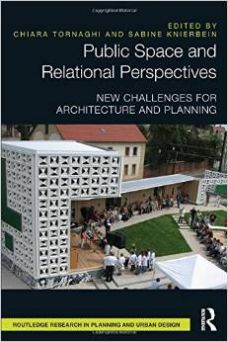Public Space and Relational Perspectives: New Challenges for Architecture and Planning

This book addresses the conceptual, practical and research challenges that contemporary pedagogy faces when adopting transdisciplinary approaches and a relational perspective to public space.
Recognizing alternative planning and design experiments in public spaces, particularly in the fields of art and activism, the authors critically analyse how these could be taken up for pedagogical experiments in architecture and planning education. The book is organized in three intertwined sections (theory, practice and research). These elaborate how to address current frictions and conflicts between institutionalized, formal spatial planning and complex patterns of daily life.
A particular highlight is the focus on playful methods and innovative pedagogical tools that enable students to learn in, about and from public space, as well as the everyday practices and everyday knowledge inscribed into them. The action-oriented pedagogy suggests that students experience and inquire into public spaces as outcomes of relations, through engaging with local residents and users in creative uses of mobile phones (Chapter 4) or computer games (Chapter 5), for instance. As such, “knowledge generated from relational practices is not just embedded, but first and foremost embodied” (page 185).
Planning experiments in Eastern Germany (Chapter 8) highlight how the potential to strengthen local democracy in public spaces can be unlocked in difficult environments. This occurs through creating performative settings that critically interact with everyday uses. The role of research and education, as emphasized throughout the book, lies not only in describing and analysing public space as a theme, but in recognizing and fostering its potential to gain socially relevant knowledge on the everyday in an inclusive, politically informed and participatory way.
In sum, authors draw on theory and European examples of pedagogical experiments and action-oriented research. They show that education based on relational approaches to public space can contribute both to particular places, by strengthening the dialogue between practice and theory, and to the capacities of future professionals to combine “the power of everyday life and the power of a planning sensitive to urban complexity and potentials (…)” (page 127).
Book note prepared by Julia Wesely
Search the Book notes database
Our Book notes database contains details and summaries of all the publications included in Book notes since 1993 - with details on how to obtain/download.
Use the search form above, or visit the Book notes landing page for more options and latest content.
For a searchable database for papers in Environment and Urbanization, go to http://eau.sagepub.com/

